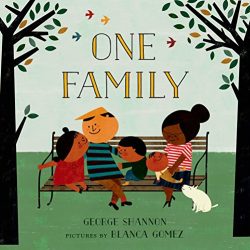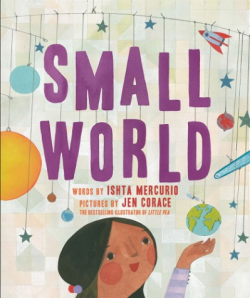Module 2: Asking Questions
Module 2: Asking Questions
Mathematicians and Readers Ask Questions
Asking questions, wondering, being curious, and striving for new understanding is an important part of learning. Young children, who are constantly learning as mathematicians and readers, are perpetually curious and asking questions! Children’s natural wonders for WHY? And HOW? are important to nurture, hear, and explore with them.

Please join us in this module, focused on asking questions, to consider how to listen to children, invite them to ask and study their own questions, and nurture their curiosity. Through two focal stories: One Family (George Shannon, 2015) and Small World (Ishta Mercurio, 2019), we will delve into questioning. We will consider how these stories provide rich opportunities to stimulate and support children’s curiosity.
Before we delve into the module, let’s take a moment to think about why asking questions is important for mathematicians and readers. In their work, mathematicians ask questions on the pathway to seeking answers and solutions. Mathematicians ask questions to understand what they (and others) think in order to generate new collective learning, much more than quickly solving a problem. Mathematicians ask questions such as, “Why does this work?” “How do we know this is true?” “Is our solution reasonable?” “Are there other possible answers to this problem?” and “What questions does this answer raise for us?” Mathematicians THINK, and thinking requires asking lots of questions.

Yet in our interactions with children, we as adults tend to give children questions to answer, ones that may have little relevance to their lives and require children to use strategies they did not think of or even understand. This kind of experience, over time, squelches children’s curiosity and joy for mathematics. By inviting children to notice and wonder through stories, and listening to their questions (rather than peppering them with ours), we create playful spaces to hear children as questioners and explore children’s questions!
Similarly, readers ask questions! Readers ask questions as they read to comprehend what is happening, form and confirm predictions, and make connections to their own experiences. Readers who ask questions as they read are actively engaged in the construction of new knowledge and connecting it to existing knowledge.
This module is an opportunity to interrupt the notion that math and reading are about speed. An overemphasis on speed, limits the vibrancy of children as mathematical and literary sense-makers. Through stories, we can create time and space to nurture the thinking of curious humans — who ask LOTS and LOTS of questions!
Although we focus on asking questions through these two stories, we believe that nearly any story is an opportunity to ask questions. We hope the ideas that we highlight in these two examples generate ideas for asking questions with any story you share with children and inspire pausing to hear children’s questions and explore their wonders!


